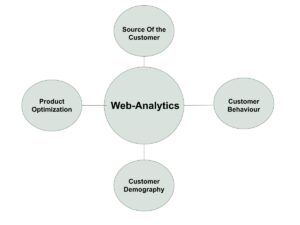How Data Analytics help businesses?
Here are a few ways that data analytics can help businesses to grow:
- Identify new opportunities: By analyzing data on market trends, customer preferences, and business performance, businesses can identify new opportunities for growth and expansion. For example, a retail company may use data analytics to identify untapped markets or new product lines that could be successful.
- Optimize operations: Data analytics can help businesses to identify bottlenecks and inefficiencies in their operations and find ways to optimize them. For example, a manufacturing company may use data analytics to streamline their production process and reduce waste.
- Improve customer experiences: By analyzing data on customer behavior and preferences, businesses can create personalized experiences that will keep customers coming back. For example, a restaurant may use data analytics to create personalized recommendations for customers based on their past orders.
- Increase efficiency: Data analytics can help businesses to automate tasks and streamline processes, which can save time and increase efficiency. For example, a logistics company may use data analytics to optimize their delivery routes and reduce fuel costs.
- Make data-driven decisions: Data analytics allows businesses to make informed decisions that are based on evidence and are more likely to lead to success. By analyzing data on key performance indicators, businesses can identify areas for improvement and track their progress over time.
Advantages of Data Analytics
Data analytics is the process of collecting, organizing, and analyzing data in order to gain insights and make informed decisions. It is a crucial tool for businesses, organizations, and individuals looking to make sense of large amounts of data and gain a competitive edge. In this blog, we will explore the many advantages of data analytics and how it can benefit organizations of all sizes.
One of the primary benefits of data analytics is the ability to make more informed decisions. By analyzing data, organizations can identify trends and patterns that may not be immediately apparent. This allows them to make data-driven decisions that are based on evidence and are more likely to lead to success. For example, a retail company may use data analytics to identify the best times to run promotions, which products are most popular among their customers, and which marketing strategies are most effective.
Data analytics also helps organizations to identify opportunities for improvement and optimization. By analyzing data on business processes, organizations can identify bottlenecks and inefficiencies that are hindering their growth and profitability. For example, a manufacturing company may use data analytics to identify production line bottlenecks, track inventory levels, and optimize their supply chain.
Another advantage of data analytics is the ability to personalize and tailor products and services to meet the needs of individual customers. By analyzing data on customer preferences, organizations can create targeted marketing campaigns and personalized recommendations that are more likely to be successful. For example, a streaming service may use data analytics to recommend movies and TV shows to individual users based on their viewing history and preferences.
Data analytics is also a valuable tool for predicting future outcomes and trends. By analyzing past data, organizations can create forecasts and projections that can help them to plan for the future. This is especially important in industries where it is difficult to predict market trends, such as finance and technology. By analyzing data on market trends, companies in these industries can make informed decisions about where to invest their resources.
One of the biggest advantages of data analytics is the ability to gain a competitive edge in the marketplace. By analyzing data, organizations can identify new opportunities, optimize their operations, and create better products and services. This allows them to stay ahead of the competition and maintain a strong market position.
In addition to these benefits, data analytics is also an important tool for compliance and risk management. By analyzing data, organizations can identify and address potential risks before they become major problems. This is particularly important in industries that are heavily regulated, such as healthcare and finance. By using data analytics, organizations can ensure that they are compliant with regulations and reduce the risk of legal and financial penalties.
In conclusion, data analytics is a powerful tool that offers a wide range of benefits to organizations of all sizes. By analyzing data, organizations can make more informed decisions, identify opportunities for improvement and optimization, personalize products and services, predict future outcomes and trends, gain a competitive edge, and manage risk. As more and more companies embrace data analytics, it is becoming an increasingly important tool for success in today’s fast-paced and competitive business environment.
Disadvantages of Data Analytics
One of the main disadvantages of data analytics is the potential for data bias. Data bias occurs when the data used to make decisions is skewed or incomplete, resulting in inaccurate or misleading conclusions. This can happen when the data is collected in a biased manner, such as by excluding certain groups or demographics. It can also happen when the data is analyzed in a biased way, such as by focusing on certain factors while ignoring others. Data bias can lead to unfair or discriminatory decision-making and can have serious consequences, particularly in fields like employment and lending.
Another disadvantage of data analytics is the potential for data breaches and misuse of personal information. As more and more data is collected and analyzed, there is a risk that it could be accessed by unauthorized parties or used for nefarious purposes. This can lead to serious privacy concerns and can damage the reputation of an organization.
A third disadvantage of data analytics is the potential for over-reliance on data. While data can be a valuable tool for decision-making, it is important to remember that it is not the only factor to consider. Relying too heavily on data can lead to a lack of creativity and critical thinking, and can result in decisions that are based solely on what the data suggests rather than what is best for the organization or its customers.
A fourth disadvantage of data analytics is the potential for technological failures. Data analytics relies on sophisticated software and hardware to collect, process, and analyze data. If these systems fail or malfunction, it can lead to errors and inaccuracies in the data, which can result in poor decision-making.
Finally, data analytics can be costly and time-consuming to implement and maintain. Organizations need to invest in the necessary hardware, software, and expertise to effectively collect and analyze data, which can be a significant financial and time commitment. Additionally, data analytics requires ongoing maintenance and updates to ensure that it is accurate and effective.
In conclusion, while data analytics can offer a wide range of benefits to organizations, it is important to be aware of its potential disadvantages. Data bias, data breaches, over-reliance on data, technological failures, and cost and time commitments are all potential drawbacks of data analytics that should be considered when deciding whether or not to use it. By understanding these potential drawbacks, organizations can make informed decisions about whether data analytics is the right tool for their needs.
Conclusion
In conclusion, data analytics is an essential tool for businesses looking to grow and thrive. By collecting and analyzing data, businesses can identify new opportunities, optimize their operations, improve customer experiences, increase efficiency, and make data-driven decisions. As more and more businesses embrace data analytics, it is becoming an increasingly important tool for success in today’s fast-paced and competitive business environment.




